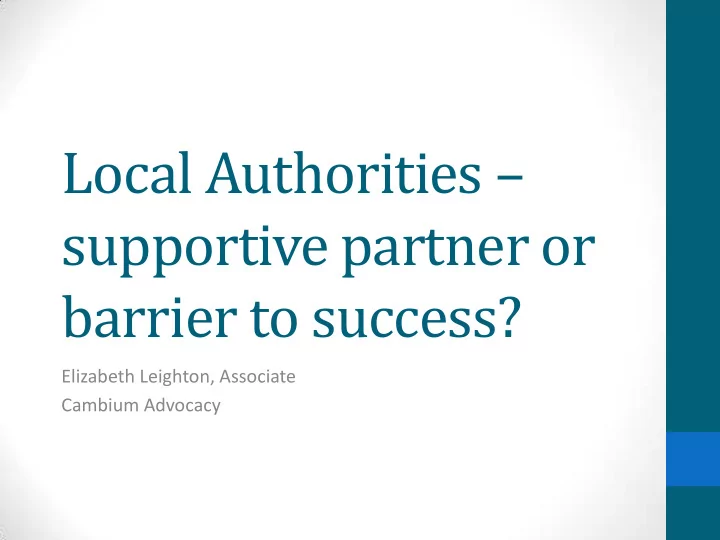

Local Authorities – supportive partner or barrier to success? Elizabeth Leighton, Associate Cambium Advocacy
Why work with local authorities? • “if the local authority doesn’t want it to happen, it won’t happen” • “the most successful projects have good relationships with their local authorities” • Framework for Community Action on Climate Change – “open or block the way” But…. • Redtape, bureaucracy, interminably long timescales • They don’t understand community groups • They’re overworked • Budget cutbacks make things worse
They need you • Budget cuts – opportunity? • Have to look outwards – how deliver services and outcomes? • Focus on the local economy – tangible examples Cosy Kirkcaldy – Service Level Agreement
Survey Results Local Authority Relationship Excellent Poor 8% 25% Satisfactory 14% Good 53%
Sustaining Dunbar Benefits: Single Outcome Agreement, pilot 20 mph zone, photovoltaic promotion, referrals, joint conferences • Use all your contacts - inform them, involve them • Be inclusive – credible community engagement • Get involved at a strategic level • Build in capacity for local authority engagement • Adapt to change and look for new opportunities
Greener Kirkcaldy Benefits: growing spaces, diggers, joint hot spot insulation campaign, referrals • Work with Energy Saving Scotland Advice Centre • Establish relationships with the people who can help you do your job – fuel poverty, allotments • Find out how you can help each other • Build in flexibility to pick up new opportunities • It takes time!
Love Milton Benefits: Planning, land-hold agreement, funding, employment placements • Make your case in terms the local authority understands • Work with all local elected officials and use them to get to heads of department • Show you are a partner, not competitor • It takes lots of time and energy
What’s your experience? • Small groups – purpose share experience and advice for other groups • Volunteer to scribe, time-keep 1) Introduce self, share one good and one difficult example of working with your local authority 15 mins (1-2 mins each) 2) Share your top tips and then as group – pick 3 to share with whole group (can be for groups and government) 15 mins • Sharing with full group – 10 mins (2 mins each)
Top Tips from workshop • Find a council officer who ‘gets’ your project – he or she will support you and can help navigate through the bureaucracy • It takes time – build in capacity to engage from the start • Be patient and don’t get frustrated when one door closes – you will find another one that opens • Do the legwork - get to know your local authority and how it works • Study the Single Outcome Agreement and find out where your objectives match • Be the solution – approach the local authority with a way to solve a problem, not demanding help. • Network with other community groups in your area – what can you learn from them? • Work with all elected members and beware party politics
Suggestions for SCCAN • F acilitate an “introduction service” for community groups within a local authority area • Pull together the community group activity in one local authority area (or on a theme over a larger area) to illustrate the scale and significance of impact • Work with local authorities to initiate new groups where needed (especially in disadvantaged areas) • Discuss with the Sustainable Scotland Network how its members can help community groups
Thank You Any further questions or contributions to the research? Contact: Elizabeth Leighton Independent consultant Associate, Cambium Advocacy Elizabeth@leightonconsulting.co.uk Mobile: 07792647005
Recommend
More recommend